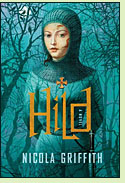Hild
by Nicola Griffith
Reviewed by Margaret Tomlinson

Hild, Abbess of Whitby, founded this Celtic-style double monastery in 657 A.D. and governed both monks and nuns there. This novel imagines her life in rich, thorough detail, beginning in early childhood when her father, a nephew of King Edwin of Northumbria, was murdered. Hild and her remaining family were taken in by King Edwin, and she was still a child when Edwin married a Christian princess who brought her chaplain to Edwin's household. The mass baptisms that eventually followed are, in this novel, portrayed as conversions more political than spiritual, with Hild's no exception.
The novel portrays Hild as the pagan she must have been before her baptism, but thoughtful rather than devout, an extraordinarily intelligent woman whose gifts as a seer, uncanny though they might seem to others, come from her perceptive observations of the world around her, from the behavior of birds and animals, harbingers of weather patterns or armies on the march, to the behavior of men and women, harbingers of war, peace and the diplomatic maneuverings in between. Hild and the people of her world are brought to life with gritty realism and great personality. This long novel, sometimes lyrical, sometimes graphically violent, comes to a close with a dramatic fictional turning point in Hild's life and that of her adored half-brother. She is still a young woman, not yet a nun, so a sequel will undoubtedly follow.
Readers may have trouble keeping track of every character in the numerous cast, most with authentically spelled Anglo-Saxon names like Æthelburh, Coelfrith and Eanflæd, and of the complex web of relations among seventh-century Britain's many kings and chieftains. Major characters are memorable, though, and as the novel progresses, Hild's story becomes ever more absorbing, the scenes more vivid. For readers unfamiliar with historical fiction, this novel may not be the best introduction, but if you can't get enough of early Britain during the transition between paganism and Christianity, it's a must-read. (2013, 546 pages including a glossary and an Author's Note on the history behind the novel)
More about Hild at Powell's Books or Amazon.comOther novels set in Anglo-Saxon England:
The Abbess of Whitby by Jill Dalladay (2016), about Hild. More info
Flight of the Sparrow by Fay Sampson (1999), about King Edwin of Northumbria and his conversion to Christianity. More info
Paths of Exile by Carla Nayland (2009), about a fugitive king in seventh-century Northumbria. See review or more info at Powell's Books
The Whispering Bell by Brian Sellars (2009), about a seventh century Anglo-Saxon woman and her struggle for justice in a male-dominated world. More info
Nonfiction about early Anglo-Saxon England:
The Ecclesiastical History of the English People by the Venerable Bede (8th century), the source of historical information about Hild.
More info at Powell's Books or read it free online at Christian Classics Ethereal Library
Hilda of Whitby: A Spirituality for Now by Ray Simpson (2014), a biography of Hilda from a devotional perspective. More info
Northumbria: 500-1100, Creation and Destruction of a Kingdom by David Rollason (2003). More info
Online:
St. Hilda, an interesting summary of what is known about the historical Hild, at the website of The Order of the Holy Paraclete, an Anglican religious community located near Hild's Whitby Abbey
Back to Novels of Anglo-Saxon England
Back to Directory of Book Reviews